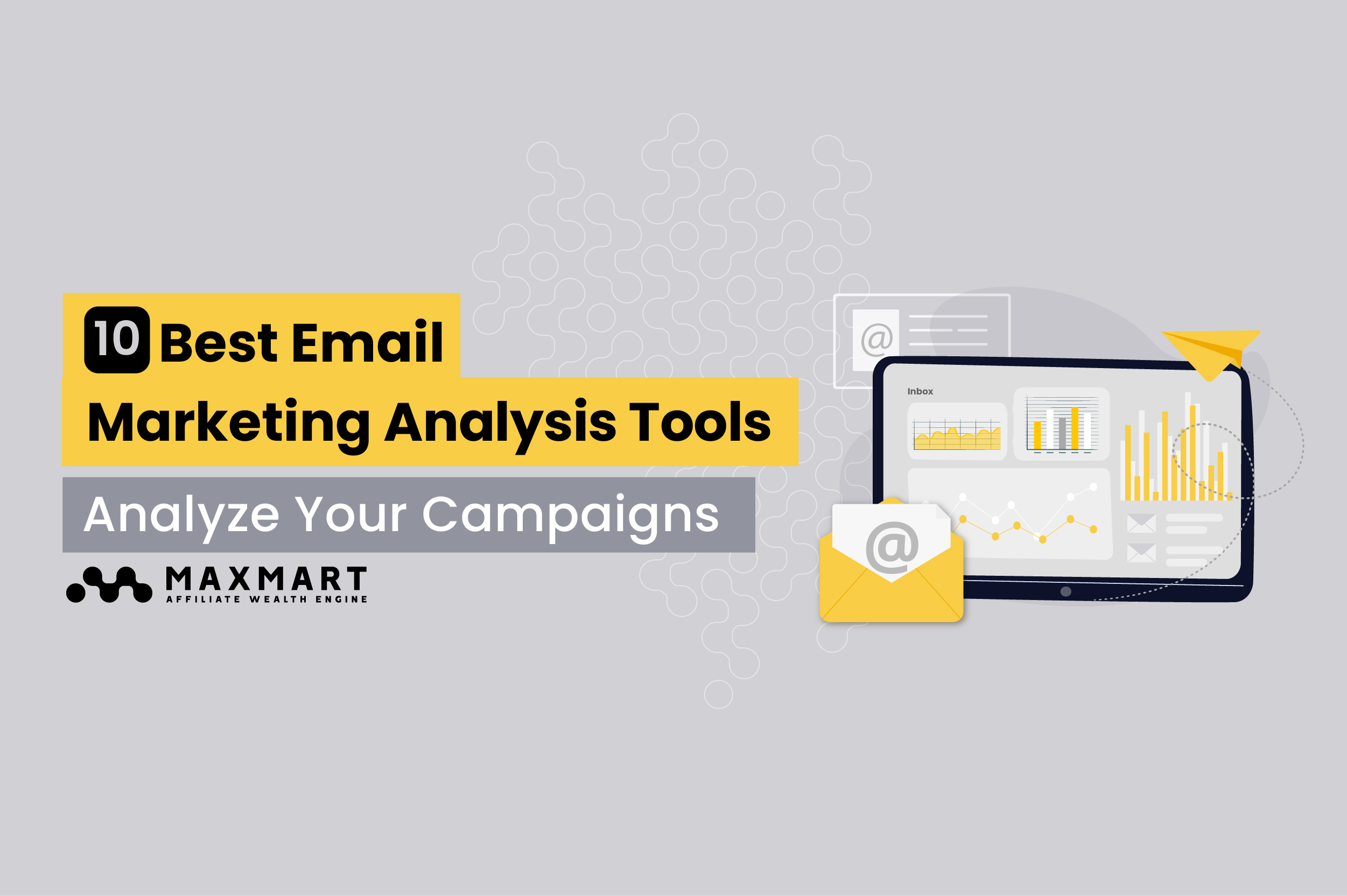email marketing analysis is more important than ever in 2025. With businesses sending millions of emails daily, understanding how your campaigns perform can make or break your marketing strategy. Recent studies show that 80% of marketers who use advanced analytics see a 2x increase in email ROI compared to those who don’t.
Data-driven decision-making plays a vital role in improving email marketing ROI. By analyzing key metrics like open rates, click-through rates, and conversion rates, businesses can optimize their campaigns to connect with the right audience at the right time. email marketing analysis tools help take the guesswork out of your strategy by providing actionable insights. In this blog, we will review and compare the best tools for email marketing analysis in 2025.
Key Features to Look for in Email Marketing Analysis Tools
Choosing the right email marketing analysis tool can transform how you manage your campaigns. To make the best choice, focus on these essential features that will help you track, analyze, and improve performance.
Real-Time Analytics and Reporting
The ability to access real-time data is crucial in 2025. It helps you monitor how your email campaigns are performing immediately after they are sent. This allows you to make quick adjustments to maximize engagement and ROI.
email marketing analysis is key to maximizing ROI in affiliate marketing and beyond. Tools that track open rates, clicks, and conversions help refine campaigns for better results. For more tips on optimizing ROI, explore our guide: Affiliate Marketing ROI.
User Engagement Metrics
A good tool should track critical engagement metrics like open rates, click-through rates, and bounce rates. These metrics give you a clear picture of how your audience interacts with your emails, so you can tailor your content to their preferences.
Integration with CRM and Other Platforms
Seamless integration with CRM systems and other marketing platforms is a must. This ensures that your email marketing analysis is connected to your broader customer data, allowing for better segmentation and personalized messaging.
AI-Driven Insights and Predictive Analytics
Advanced tools now use artificial intelligence to uncover trends and predict future performance. Features like automated recommendations and predictive analytics enable you to plan smarter campaigns based on data-driven forecasts.
Ease of Use and Customizable Dashboards
No matter how powerful a tool is, it won’t be helpful if it’s hard to use. Look for email marketing analysis tools that offer intuitive interfaces and customizable dashboards. This lets you focus on the metrics that matter most to your business.
Top 10 Email Marketing Analysis Tools of 2025: Evaluate, and Adjust for Increased Outreach
Now that we’ve explored the key features to look for in email analytics tools, it’s time to dive into the top solutions available in 2025. These tools have been carefully selected based on their ability to deliver actionable insights, improve campaign performance, and simplify data analysis
1. Omnisend

Omnisend is an all-in-one marketing automation platform designed to help businesses enhance their email marketing efforts. Known for its robust automation capabilities, Omnisend combines email marketing analysis with SMS, push notifications, and other channels to create a seamless customer experience. What sets Omnisend apart is its focus on helping businesses drive sales through personalized, multi-channel campaigns. It’s a favorite among e-commerce brands looking to boost engagement and conversions.
Pros
- Powerful Automation: Omnisend excels at automating workflows, making it easier to nurture leads and re-engage customers.
- Comprehensive email marketing analysis: It provides detailed insights into campaign performance, including advanced segmentation and sales tracking.
- Multi-Channel Marketing: Beyond email, Omnisend integrates SMS and push notifications into campaigns for a unified marketing strategy.
- E-commerce Integrations: Direct integration with Shopify, WooCommerce, and BigCommerce makes it ideal for online stores.
- User-Friendly Interface: Easy to set up and navigate, even for beginners.
Cons
- Limited Customization: While templates are easy to use, some advanced customization options are less flexible.
- Pricing for Advanced Features: Premium plans with advanced analytics and automation features can be costly for small businesses.
Pricing
- Free Plan: Basic email campaigns for up to 250 contacts, 500 emails per month.
- Standard Plan: Starts at $16/month for 6,000 emails/month and advanced reporting.
- Pro Plan: Starts at $59/month for unlimited emails, SMS credits, and premium features.
- Enterprise Plan: Custom pricing for high-volume senders with dedicated support.
Verdict
Omnisend is a standout tool for businesses looking to integrate email marketing analysis with a broader multi-channel strategy. Its automation and e-commerce integrations make it an excellent choice for online retailers seeking to maximize sales. While smaller businesses may find some plans pricey, the value provided by its features justifies the cost for growth-focused organizations.
2. Klaviyo
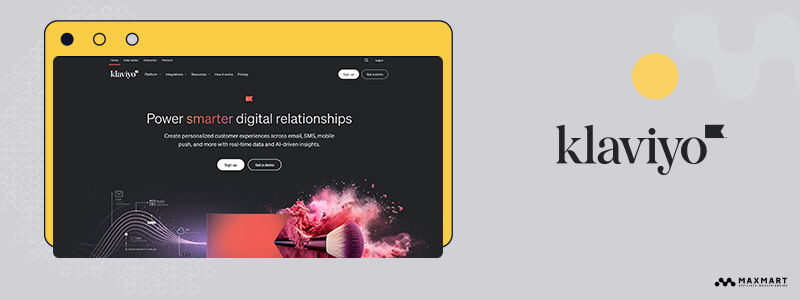
Klaviyo is a powerful email marketing platform tailored to e-commerce businesses. Known for its data-driven approach, Klaviyo excels at providing in-depth email marketing analysis and customer insights. What sets Klaviyo apart is its ability to integrate seamlessly with e-commerce platforms like Shopify and WooCommerce, enabling brands to leverage real-time data for personalized email campaigns. It’s an ideal choice for businesses looking to build long-term customer relationships through highly targeted marketing.
Pros
- Advanced Segmentation: Klaviyo allows precise audience targeting using behavioral and transactional data.
- Robust email marketing analysis: The platform offers detailed reports on revenue attribution, customer lifetime value, and engagement metrics.
- E-Commerce Integrations: Deep integration with platforms like Shopify, Magento, and BigCommerce makes syncing customer data seamless.
- Automation at Scale: Pre-built templates and workflows simplify creating automated campaigns like abandoned cart reminders and post-purchase follow-ups.
- Scalable for Growth: Klaviyo’s tools grow with your business, making it a long-term investment for scaling e-commerce operations.
Cons
- Learning Curve: Beginners might find the interface and features overwhelming initially.
- Pricing for Large Lists: Costs can add up as your subscriber list grows, particularly for businesses with limited budgets.
Pricing
- Free Plan: Up to 500 contacts with 5,000 email sends per month.
- Paid Plans: Start at $20/month for up to 500 contacts, with pricing increasing based on list size and additional features.
- SMS Add-On: Optional SMS marketing starts at $5/month, based on usage.
Verdict
Klaviyo is a top-tier choice for e-commerce businesses seeking advanced email marketing analysis and customer personalization. Its deep integrations and data-driven insights make it a must-have for brands aiming to optimize their marketing efforts and boost sales. While the platform may be pricey for smaller brands, its features are worth the investment for businesses focused on long-term growth and customer retention.
3. HubSpot Marketing
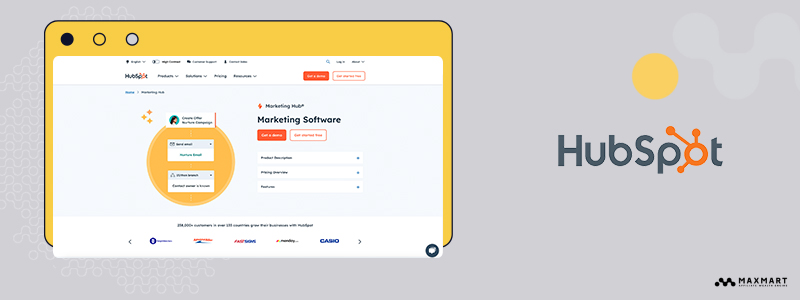
HubSpot Marketing is a comprehensive marketing platform that combines email marketing analysis with CRM, automation, and a suite of other tools. What makes HubSpot Marketing unique is its all-in-one approach, offering businesses a centralized hub to manage their entire marketing strategy. This includes email campaigns, lead generation, social media, and more, making it a powerful solution for businesses of all sizes.
Pros
- Integrated CRM: HubSpot’s native CRM integration allows seamless tracking of customer interactions across channels.
- Detailed email marketing analysis: The platform provides robust insights into open rates, click-through rates, and customer journeys, helping businesses refine campaigns.
- Automation Capabilities: Users can set up complex workflows for lead nurturing, sales follow-ups, and more without technical expertise.
- Scalable: Suitable for small businesses and enterprises, with tools that adapt as your organization grows.
- User-Friendly Interface: Intuitive design makes it easy to create and analyze campaigns, even for non-technical users.
Cons
- Pricing for Advanced Features: Some of the most valuable features, such as advanced analytics and marketing automation, are available only on higher-tier plans.
- Learning Curve: The vast array of tools can be overwhelming for new users without prior experience in marketing platforms.
Pricing
- Free Plan: Includes basic email marketing, CRM, and reporting tools.
- Starter Plan: Starts at $20/month for up to 1,000 contacts, including automation and expanded analytics.
- Professional Plan: Starts at $800/month with advanced segmentation, ABM tools, and more robust analytics.
- Enterprise Plan: Starts at $3,600/month for large-scale operations, custom reports, and premium support.
Verdict
HubSpot Marketing stands out as a versatile and powerful platform for businesses that need more than just email marketing analysis. Its integration of CRM, automation, and analytics makes it an all-encompassing solution for building a unified marketing strategy. While the higher-tier plans are expensive, the platform’s scalability and feature depth make it a worthwhile investment for businesses committed to growth. For those just starting out, the free and starter plans provide plenty of functionality to get started.
4. Segment
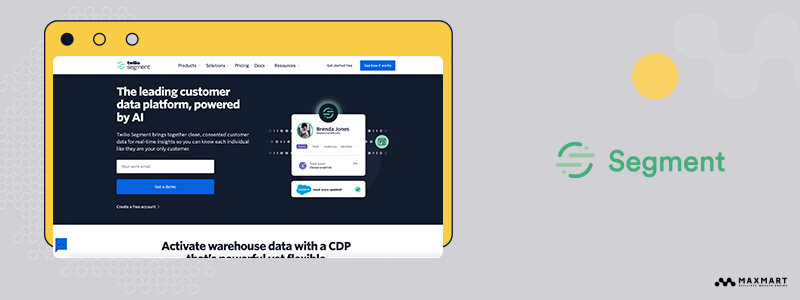
Segment is a customer data platform (CDP) that excels at centralizing and streamlining data from various sources, including email analysis. What sets Segment apart is its ability to unify data from multiple platforms, creating a single source of truth for customer insights. By providing businesses with a 360-degree view of their customers, Segment enables highly personalized and data-driven email marketing strategies.
Pros
- Data Centralization: Consolidates data from email platforms, websites, apps, and more into a single, organized database.
- Advanced email marketing analysis: Offers granular insights into customer behaviors, enabling hyper-targeted email campaigns.
- Robust Integrations: Supports over 300 integrations with tools like Mailchimp, Klaviyo, and HubSpot.
- Real-Time Data Delivery: Updates and synchronizes customer data in real-time for up-to-date analytics and personalization.
- Developer-Friendly: Offers extensive APIs and documentation for businesses with technical teams wanting custom configurations.
Cons
- Complex Setup: The platform may require technical expertise to fully implement and customize.
- Pricing for Small Businesses: Segment’s robust features can be cost-prohibitive for smaller companies with limited budgets.
Pricing
- Free Plan: Includes tracking for up to 1,000 visitors per month and basic integrations.
- Team Plan: Starts at $120/month, designed for scaling businesses with additional data tools.
- Business Plan: Custom pricing for enterprises needing advanced features, support, and data volumes.
Verdict
Segment is a powerful solution for businesses looking to leverage email marketing analysis as part of a larger data strategy. Its ability to centralize and unify data across multiple platforms makes it an invaluable tool for creating highly personalized and effective marketing campaigns. While the setup may be complex for smaller businesses, Segment’s features are indispensable for organizations prioritizing data-driven marketing and seamless customer experiences.
5. Braze
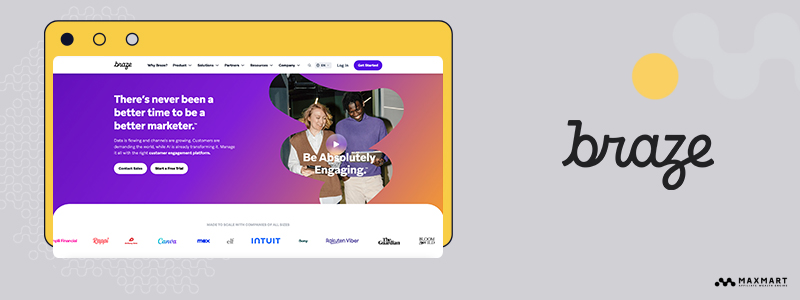
Braze is a customer engagement platform designed to help businesses create personalized, multi-channel marketing campaigns. It’s particularly strong in analytics for email marketing, providing rich insights into customer behavior and campaign performance. What makes Braze stand out is its focus on real-time, cross-channel engagement, enabling marketers to connect with their audience seamlessly across email, mobile, and web platforms. This makes it a popular choice for brands aiming to build stronger customer relationships.
Pros
- Real-Time Personalization: Braze uses customer data to deliver dynamic, highly relevant email content.
- Advanced email marketing analysis: Offers deep insights into user engagement, revenue impact, and campaign performance.
- Cross-Channel Capabilities: Combines email marketing with push notifications, in-app messaging, and SMS for a unified customer experience.
- Strong API and Integrations: Works well with tools like Segment, Salesforce, and Snowflake, enabling data centralization and advanced workflows.
- Scalability: Ideal for businesses of all sizes, from startups to global enterprises.
Cons
- High Learning Curve: The platform’s extensive features may be overwhelming for small teams or beginners.
- Expensive for Small Businesses: Braze’s advanced capabilities come at a premium, which may not fit every budget.
Pricing
Braze does not publicly disclose fixed pricing, as plans are custom-built based on factors such as the number of active users, channels used, and features required. Businesses should contact Braze for a quote.
Verdict
Braze is an excellent choice for businesses that want to combine email marketing analysis with a broader multi-channel engagement strategy. Its real-time capabilities and deep personalization options make it ideal for brands focused on delivering highly tailored customer experiences. While the pricing and complexity may deter smaller businesses, Braze’s robust feature set justifies the investment for organizations aiming for sophisticated, data-driven marketing.
6. SendPulse
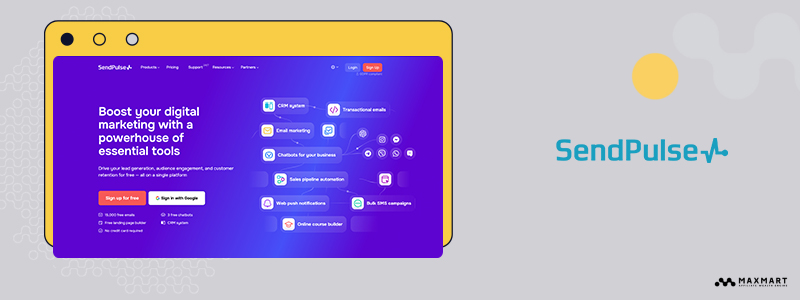
SendPulse is a multi-channel marketing platform that integrates email marketing analysis with SMS, push notifications, and chatbot messaging. What sets SendPulse apart is its user-friendly design and affordability, making it accessible to businesses of all sizes. The platform is ideal for businesses seeking a straightforward yet effective solution for managing their email marketing campaigns while exploring other communication channels.
Pros
- Ease of Use: Intuitive drag-and-drop editor and simple navigation make it beginner-friendly.
- Comprehensive email marketing analysis: Tracks open rates, click-through rates, and subscriber behaviors in real-time.
- Affordable Pricing Plans: Offers competitive pricing, making it a great option for startups and small businesses.
- Multi-Channel Support: Combines email with SMS, push notifications, and chatbots for broader customer engagement.
- AI-Powered Recommendations: Suggests improvements to campaigns based on historical performance data.
Cons
- Limited Advanced Features: Compared to higher-end tools, it may lack advanced automation or segmentation options.
- Basic Reporting Design: While the analytics are effective, the reporting interface can feel simplistic for data-heavy users.
Pricing
- Free Plan: Up to 500 subscribers and 15,000 emails per month.
- Standard Plan: Starts at $8/month for 1,000 subscribers, with features like automation and basic analytics.
- Pro Plan: Starts at $9.85/month for more advanced automation and priority support.
- Enterprise Plan: Custom pricing for businesses needing higher volume and advanced tools.
Verdict
SendPulse is a strong contender for small and medium-sized businesses looking to explore email marketing analysis without breaking the bank. Its multi-channel capabilities and affordability make it a practical choice for businesses looking to scale their outreach. While it may not have all the advanced features of premium platforms, it provides excellent value for businesses seeking a user-friendly, budget-friendly solution.
7. Improvado
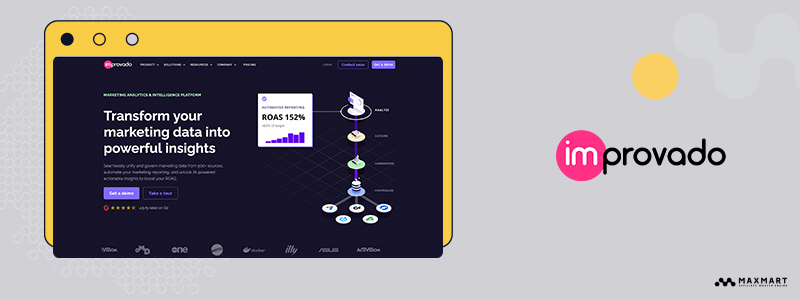
Improvado is a robust marketing analytics platform designed to centralize and visualize data from multiple sources, including email marketing analysis. What makes Improvado unique is its ability to aggregate and transform data from over 500 marketing tools, providing a single, unified view of performance across campaigns. This solution is ideal for data-driven organizations looking to simplify and scale their marketing analytics processes.
Pros
- Centralized Data Management: Integrates with major email marketing platforms, consolidating analytics into one easy-to-access dashboard.
- Customizable Dashboards: Offers highly flexible reporting tools tailored to specific business needs.
- Comprehensive email marketing analysis: Tracks key metrics like open rates, click-through rates, and campaign ROI across channels.
- Scalable for Enterprises: Handles large data volumes and complex data transformations, making it ideal for larger organizations.
- Dedicated Support: Provides hands-on onboarding and customer support for seamless implementation.
Cons
- High Price Point: Premium features and scalability come at a cost, which may be out of reach for smaller businesses.
- Requires Technical Expertise: The platform’s advanced features may require some technical knowledge for setup and customization.
Pricing
- Starter Plan: Custom pricing tailored to the needs of smaller teams or projects.
- Enterprise Plan: Pricing varies based on the scale of data integrations, team size, and advanced feature requirements. Businesses must request a quote for exact details.
Verdict
Improvado is a top-tier solution for businesses seeking to centralize and optimize their email marketing analysis alongside other marketing data. Its strength lies in its ability to consolidate data from multiple tools into actionable insights, making it invaluable for enterprise-level organizations. While its pricing and complexity may not suit smaller teams, Improvado’s comprehensive capabilities are worth the investment for companies focused on data-driven decision-making and streamlined reporting.
8. Keap
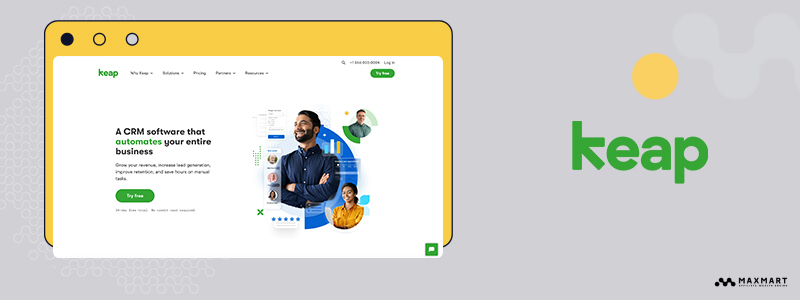
Keap (formerly Infusionsoft) is an all-in-one CRM and marketing automation platform that integrates email marketing analysis with sales and customer relationship management. Keap’s standout feature is its ability to streamline marketing and sales workflows, making it ideal for small to medium-sized businesses looking to simplify operations. By combining email marketing, automation, and lead management, Keap helps businesses save time and improve customer engagement.
Pros
- Built-In CRM: Integrates email marketing analysis with customer data, providing a complete view of the customer journey.
- Easy Automation: Pre-built templates and workflows simplify campaign creation and lead nurturing.
- email marketing analysis: Tracks open rates, click-through rates, and conversions, offering actionable insights to improve campaigns.
- User-Friendly Interface: Intuitive design makes it accessible for users without technical expertise.
- Comprehensive Solution: Combines email marketing, CRM, and payment processing in one platform.
Cons
- Limited Advanced Features: Lacks the depth of analytics and customization options offered by enterprise-grade tools.
- Pricing for Small Businesses: While affordable for what it offers, it may be a stretch for startups with tight budgets.
Pricing
- Lite Plan: Starts at $159/month for up to 500 contacts, includes basic CRM and email automation.
- Pro Plan: Starts at $199/month, adds advanced marketing automation and reporting tools for up to 1,500 contacts.
- Max Plan: Starts at $249/month, offers more integrations, analytics, and up to 2,500 contacts.
- Custom Pricing: Available for businesses requiring additional contacts or features.
Verdict
Keap is an excellent option for small to medium-sized businesses seeking a straightforward yet comprehensive platform. Its integration of email analytics for outlook with CRM and automation makes it a valuable tool for simplifying workflows and improving customer relationships. While it may lack the advanced analytics features of enterprise tools, Keap’s ease of use and well-rounded capabilities make it a strong choice for growing businesses.
9. Vision6

Vision6 is an email marketing platform tailored for small to medium-sized businesses, agencies, and marketers who need simple yet effective tools for managing campaigns. What sets Vision6 apart is its focus on ease of use, making it an excellent choice for businesses with limited technical expertise. It combines email marketing analysis, automation, and integrations with a drag-and-drop interface that simplifies creating and analyzing campaigns.
Pros
- User-Friendly Design: The intuitive interface allows even beginners to create professional email campaigns quickly.
- Comprehensive email marketing analysis: Tracks key metrics like open rates, click-through rates, and deliverability to help optimize campaigns.
- Customizable Templates: Offers a wide range of pre-designed templates that are easy to personalize.
- Local Support (Australia-Focused): Provides strong customer support and compliance with Australian email marketing standards.
- Affordable for SMBs: Offers competitive pricing plans suitable for smaller businesses.
Cons
- Limited Advanced Features: May not have the robust automation or analytics depth required by larger enterprises.
- Regional Focus: While it works globally, Vision6 has a stronger presence and support in Australia, which might be a drawback for some international users.
Pricing
- Free Plan: No free plan, but free trials are available.
- Starter Plan: Begins at $9/month for up to 250 contacts with basic analytics and features.
- Business Plan: Starts at $29/month for up to 1,000 contacts, offering more templates and automation options.
- Pro Plan: Custom pricing for advanced features and larger contact lists.
Verdict
Vision6 is a fantastic choice for small to medium-sized businesses and marketers who value simplicity and affordability. Its ease of use and focus on email marketing analysis make it ideal for businesses looking to improve their campaigns without investing in complex platforms. While it may lack the advanced capabilities of enterprise-level tools, its user-friendly approach and budget-friendly pricing make it a solid option for growing businesses.
10. Mailchimp

Mailchimp analytics is one of the most popular email marketing platforms, offering a mix of email marketing analysis, automation, and design tools. Its versatility and ease of use make it suitable for businesses of all sizes, from startups to large enterprises. Known for its intuitive interface and robust free plan, Mailchimp is an industry leader that continues to innovate with AI-driven insights and multi-channel capabilities.
Pros
- Comprehensive email marketing analytics: Provides detailed reports on open rates, click-through rates, and customer behavior, along with revenue attribution.
- User-Friendly Interface: A drag-and-drop email builder and pre-designed templates make creating campaigns simple for beginners.
- Multi-Channel Features: Supports email, social media ads, landing pages, and more, enabling an integrated marketing strategy.
- Free Plan: Offers a robust free tier with essential analytics and tools, ideal for small businesses starting out.
- AI-Powered Insights: Uses machine learning to recommend send times, segment audiences, and optimize campaigns.
Cons
- Pricing for Advanced Features: Premium features, such as advanced segmentation and detailed analytics, are locked behind higher-tier plans.
- Limited Customer Support on Free Plan: Free users only have access to email support, which can delay issue resolution.
Pricing
- Free Plan: For up to 500 contacts and 1,000 monthly email sends, with basic analytics and templates.
- Essentials Plan: Starts at $13/month for 500 contacts, offering custom branding and A/B testing.
- Standard Plan: Starts at $20/month for up to 500 contacts, with advanced automation and audience insights.
- Premium Plan: Begins at $350/month for up to 10,000 contacts, providing advanced segmentation, comparative reporting, and priority support.
Verdict
Mailchimp is a well-rounded platform that balances simplicity with powerful features, making it an excellent choice for businesses at any stage. Its comprehensive email marketing analysis and AI-driven insights empower marketers to optimize their campaigns effectively.
While the free plan is a great entry point for smaller teams, businesses looking for advanced tools and analytics should consider investing in the Standard or Premium plans. Mailchimp’s reputation and continuous updates ensure it remains a top-tier choice for email marketing in 2025.
Conclusion
Choosing the right email marketing analysis tool is crucial for optimizing campaigns and boosting ROI. The tools highlighted in this blog offer features for every business need, whether you’re just starting out or scaling up. Take advantage of free trials and demos to find the perfect fit for your goals.
At MaxMart, we’re dedicated to helping you establish a strong online presence and drive traffic effectively. As a trusted resource, we provide honest reviews of email marketing tools, domain tools, SEO tools, and more, along with actionable insights and guides. Explore our content to make informed decisions and grow your business confidently—without the hype.

